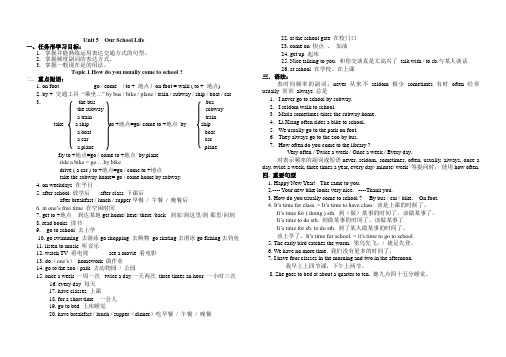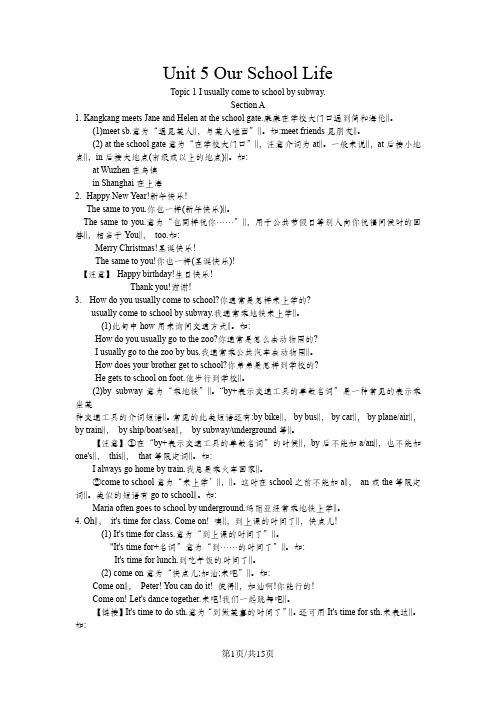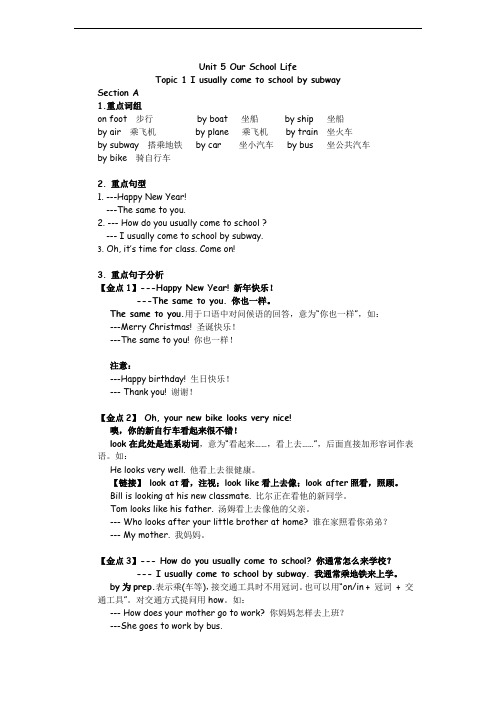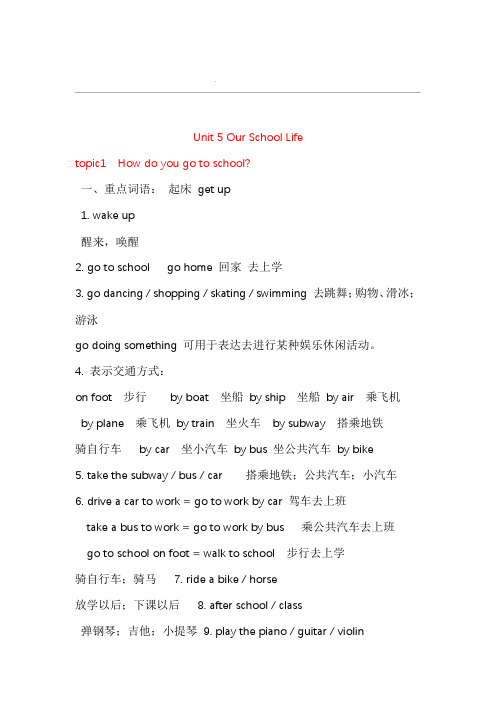Unit 5 Our School Life知识点总结(仁爱七下)
- 格式:docx
- 大小:26.54 KB
- 文档页数:22

Unit 5 Our School Life一、任务形学习目标:1.掌握并能熟练运用表达交通方式的句型。
2.掌握频度副词的表达方式。
3.掌握一般现在是的用法。
Topic 1 How do you usually come to school ?二.重点短语:1. on foot go / come (to + 地点)on foot = walk ( to + 地点)2. by + 交通工具“乘坐…” by bus / bike / plane / train / subway / ship / boat / car3. the bus busthe subway subwaya train traintake a ship to +地点=go/ come to +地点by shipa boat boata car cara plane planefly to +地点=go / come to +地点by planeride a bike = go …by bikedrive ( a car ) to +地点=go / come to +地点take the subway home= go / come home by subway4. on weekdays 在平日5. after school 放学后 after class 下课后after breakfast / lunch / supper早餐/ 午餐/ 晚餐后6. in one’s free time 在空闲时间7. get to +地点到达某地get home/ here/ there /back 到家/到这里/到那里/回到8. read books 读书9. go to school 去上学10. go swimming 去游泳 go shopping 去购物go skating去滑冰go fishing去钓鱼11. listen to music 听音乐12. watch TV 看电视see a movie 看电影13. do(one’s)homework 做作业14. go to the zoo / park 去动物园/ 公园15. once a week 一周一次twice a day一天两次three times an hour 一小时三次16. every day 每天17. have classes 上课18. for a short time 一会儿19. go to bed 上床睡觉20. have breakfast / lunch / supper(dinner)吃早餐/ 午餐/ 晚餐22. at the school gate 在校门口23. come on 快点、加油24. get up 起床25. Nice talking to you. 和你交谈真是太高兴了talk with / to sb.与某人谈话26. at school 在学校、在上课三.语法:表时间频率的副词:never 从来不seldom 极少sometimes 有时often 经常usually 常常always 总是1.I never go to school by subway.2.I seldom walk to school.3.Maria sometimes takes the subway home.4.Li Xiang often rides a bike to school.5.We usually go to the park on foot.6.They always go to the zoo by bus.7.How often do you come to the library ?Very often / Twice a week / Once a week / Every day.对表示频率的副词或短语never, seldom, sometimes, often, usually, always, once a day, twice a week, three times a year, every day/ minute/ week 等提问时,使用how often.四. 重要句型1. Happy New Year! The same to you.2.---- Your new bike looks very nice. ----Thank you.3. How do you usually come to school ? By bus / car / bike. On foot.4. It’s time for class. = It’s time to have class. 该是上课的时候了。

Unit 5 Our School LifeTopic 1 I usually come to school by subway.Section A1. Kangkang meets Jane and Helen at the school gate.康康在学校大门口遇到简和海伦||。
(1)meet sb.意为“遇见某人||,与某人碰面”||。
如:meet friends见朋友||。
(2) at the school gate意为“在学校大门口”||,注意介词为at||。
一般来说||,at后接小地点||,in后接大地点(市级或以上的地点)||。
如:at Wuzhen在乌镇in Shanghai在上海2. -Happy New Year!新年快乐!-The same to you.你也一样(新年快乐)||。
The same to you.意为“也同样祝你……”||,用于公共节假日等别人向你祝福问候时的回答||,相当于You||,too.如:-Merry Christmas!圣诞快乐!-The same to you!你也一样(圣诞快乐)!【注意】-Happy birthday!生日快乐!-Thank you!谢谢!3. --How do you usually come to school?你通常是怎样来上学的?-- usually come to school by subway.我通常乘地铁来上学||。
(1)此句中how用来询问交通方式||。
如:-How do you usually go to the zoo?你通常是怎么去动物园的?-I usually go to the zoo by bus.我通常乘公共汽车去动物园||。
-How does your brother get to school?你弟弟是怎样到学校的?-He gets to school on foot.他步行到学校||。

Unit 5 Our School Life Topic 1 How do you usually come to school?一、语法:频度副词二、重点句型: 1.I never come to school by subway.Maria sometimes takes the subway home.2.go to the park on foot.We usually3.I seldom walk to school.4.Li Xiang often rides a bike to school.5.go to the zoo by bus.They always6.--Happy New Year!/ The same to you.--Happy New Year!7.The early bird catches the worm.8.She goes to bed at about a quarter to ten.9.--Three times a week./ Very often./do you come to the library?10. --How oftenEvery day., plane, train, ship, boat, always, come on, on foot三、单词:gate, by, subway, sometimes,seldom, walk, never, ride, park, weekday, early, bird, catch, worm,after, bed, basketball, swim, movie, begin,at school,watch, TV, watch TV, soccer,life, Wall,twice, great, wall,the Great listen, music, library, week, once, American, or, over, more, talk四、重点知识点,,1. The same to you也祝你。

Unit5 Our School LifeTopic1 I usually come to school by subwayU5 T1 Section A核心知识点:1.Kangkang meets Jane and Helen at the school gate.康康在学校大门口遇到简和海伦。
(1)meet sb.意为“遇见某人,与某人碰面”。
如:meet friends见朋友。
(2)at the school gate意为“在学校大门口”,注意介词为at。
一般来说,at后接小地点,in后接大地点(市级或以上的地点)。
如:at Wuzhen 在乌镇,in Shanghai 在上海2.-Happy New Year!新年快乐!-The same to you.你也一样(新年快乐)。
The same to you意为“也同样祝你……”用于公共节假日等别人向你祝福问候时的回答,相当于You,too.如:-Merry Christmas!圣诞快乐!-The same to you!你也一样(圣诞快乐)!【注意】-Happy birthday!生日快乐!-Thank you!3.-How do you usually come to school? 你通常是怎样来上学的?-I usually come to school by subway.我通常乘地铁来上学。
(1)此句中how用来询问交通方式。
如:-How do you usually go to the zoo?你通常是怎么去动物园的?-I usually go to the zoo by bus.我通常乘公共汽车去动物园。
-How does your brother get to school?你弟弟怎样到学校的?-He gets to school on foot.他步行到学校。
(2)by subway意为“乘地铁”。
“by+表示交通工具的单数名词”是一种常见的表示乘坐某种交通工具的介词短语。

Unit 5 Our School LifeTopic 1 I usually come to school by subwaySection A1.重点词组on foot 步行by boat 坐船by ship 坐船by air 乘飞机by plane 乘飞机by train 坐火车by subway 搭乘地铁by car 坐小汽车by bus 坐公共汽车by bike 骑自行车2. 重点句型1. ---Happy New Year!---The same to you.2. --- How do you usually come to school ?--- I usually come to school by subway.3.Oh, it’s time for class. Come on!3. 重点句子分析【金点1】---Happy New Year! 新年快乐!---The same to you. 你也一样。
The same to you.用于口语中对问候语的回答,意为“你也一样”,如:---Merry Christmas! 圣诞快乐!---The same to you! 你也一样!注意:---Happy birthday! 生日快乐!--- Thank you! 谢谢!【金点2】 Oh, your new bike looks very nice!噢,你的新自行车看起来很不错!look在此处是连系动词,意为“看起来……,看上去……”,后面直接加形容词作表语。
如:He looks very well. 他看上去很健康。
【链接】 look at看,注视;look like看上去像;look after照看,照顾。
Bill is looking at his new classmate. 比尔正在看他的新同学。
Tom looks like his father. 汤姆看上去像他的父亲。

.Unit 5 Our School Lifetopic1 How do you go to school?一、重点词语:起床get up1. wake up醒来,唤醒2. go to school go home 回家去上学3. go dancing / shopping / skating / swimming 去跳舞;购物、滑冰;游泳go doing something 可用于表达去进行某种娱乐休闲活动。
4. 表示交通方式:on foot 步行by boat 坐船by ship 坐船by air 乘飞机by plane 乘飞机by train 坐火车by subway 搭乘地铁骑自行车by car 坐小汽车by bus 坐公共汽车by bike5. take the subway / bus / car 搭乘地铁;公共汽车;小汽车6. drive a car to work = go to work by car 驾车去上班take a bus to work = go to work by bus 乘公共汽车去上班go to school on foot = walk to school 步行去上学骑自行车;骑马7. ride a bike / horse放学以后;下课以后8. after school / class弹钢琴;吉他;小提琴9. play the piano / guitar / violinplay basketball / soccer / football 打篮球;踢足球;打橄榄球play computer games 玩电脑游戏玩电脑play with a computer做运动play sports紧挨着,在…旁边10. next to一幅我们学校的平面图11. a plan of my school12. on weekdays 在工作日文档Word.at weekends 在周末13. have breakfast / lunch / supper / dinner / meals吃早餐;中餐;晚餐;正餐;一日三餐have classes / lessons / a meeting 上课;上课;开会看电视;电影;比赛;动物14. watch TV / movies / games / the animalsread novels / newspapers / books 看小说;报纸;书洗脸;衣服/ clothes15. wash one's face近义词:quickly –fast16. 反义词:up –down, early –lateget up early 早起be late for 迟到第一;二;三;四天17. the first / second / third / fourth day18. clean the house 打扫房子19. 表示建筑物(尤其学校建筑物):on the playground 在操场在学校;家里;桌旁at school / home / tablein a computer room / teachers' office / classroom building / gym / library / lab /canteen在电脑室;教师办公室;教学楼;体操馆;图书馆;实验室;食堂大约在六点20. around six o'clock = at about six o'clock21. 频率副词:never, seldom, sometimes, often, usually, always二、重点句型:1. It's time to get up. 该起床的时候了。
Unit 5 Our School LifeTopic1 How do you go to school?一、重点词语:1. wake up 醒来,唤醒get up 起床2. go to school 去上学go home 回家3. go dancing / shopping / skating / swimming 去跳舞;购物、滑冰;游泳拓展总结:go+v ing可用于表达去进行某种娱乐休闲活动。
4. 表示交通方式:by+交通工具名称,表示使用某种交通方式,中间不加限定词,如果交通工具前有a, the, my 等限定词,就不能用by,而是用in或是on. 例如:on the train=by train on his bike=by bike in my car=by car.on foot 步行by boat 坐船by ship 坐船by air 乘飞机by plane 乘飞机by train坐火车by subway 搭乘地铁by car 坐小汽车by bus 坐公共汽车by bike 骑自行车5. take the subway / bus / car 搭乘地铁;公共汽车;小汽车6. drive a car to work = go to work by car 驾车去上班take a bus to work = go to work by bus 乘公共汽车去上班go to school on foot = walk to school 步行去上学7. ride a bike / horse 骑自行车;骑马8. after school / class 放学以后;下课以后9. play the piano / guitar / violin 弹钢琴;吉他;小提琴play basketball / soccer / football 打篮球;踢足球;打橄榄球play computer games 玩电脑游戏play with a computer 玩电脑play sports 做运动10. next to 紧挨着,在…旁边11. know about 知道,了解12. on weekdays 在工作日at weekends 在周末13. have breakfast / lunch / supper / dinner / meals吃早餐;中餐;晚餐;正餐;一日三餐have classes / lessons / a meeting 上课;上课;开会14. watch TV / movies / games / the animals 看电视;电影;比赛;动物read novels / newspapers / books 看小说;报纸;书15. wash one’s f ace / clothes 洗脸;衣服16. 反义词:up – down, early – late 近义词:quickly – fast get up early 早起be late for 迟到17. the first / second / third / fourth day 第一;二;三;四天18. clean the house 打扫房子19. 表示建筑物(尤其学校建筑物):on the playground 在操场at school / home / table 在学校;家里;桌旁in a computer room / teachers’ office / classroom building / gym / library / lab / canteen在电脑室;教师办公室;教学楼;体操馆;图书馆;实验室;食堂20. around six o’clock = at about six o’clock大约在六点21. 频率副词:never, seldom, sometimes, often, usually, always22. do my homework at school 在学校做作业do one’s homework 做家庭作业(注意:one’s 要随主语的变化而变化,常用形容词性物主代词my, your, their, our, his, her 等)。
Unit 5 Our School LifeTopic 1 How do you usually come to school?一、语法:频度副词二、重点句型:1.I never come to school by subway.2.Maria sometimes takes the subway home.3.We usually go to the park on foot.4.I seldom walk to school.5.Li Xiang often rides a bike to school.6.They always go to the zoo by bus.7.--Happy New Year!--Happy New Year!/ The same to you.8.The early bird catches the worm.9.She goes to bed at about a quarter to ten.10. --How often do you come to the library?--Three times a week./ Very often./ Every day.三、单词: gate, by, subway, always, come on, on foot, plane, train, ship, boat, weekday, early, bird, catch, worm, sometimes,seldom, walk, never, ride, park, watch, TV, watch TV, soccer, movie, begin,at school, after, bed, basketball, swim, listen, music, library, week, once, twice, great, wall,the Great Wall,life, American, or, over, more, talk四、重点知识点1. The same to you也祝你,,。
Unit 5 Our School Life知识点总结(仁爱七下) Unit ur Shl Lifetpi1 H d u g t shl?一、重点词语:1 ae up 醒,唤醒get up 起床2 g t shl 去上学g he 回家3 g daning / shpping / sating / siing 去跳舞;购物、滑冰;游泳g ding sething 可用于表达去进行某种娱乐休闲活动。
4 表示交通方式:n ft 步行b bat 坐船b ship 坐船b air 乘飞机b plane 乘飞机b train 坐火车b suba 搭乘地铁b ar 坐小汽车b bus 坐公共汽车b bie 骑自行车tae the suba / bus / ar 搭乘地铁;公共汽车;小汽车6 drive a ar t r = g t r b ar 驾车去上班tae a bus t r = g t r b bus 乘公共汽车去上班g t shl n ft = al t shl 步行去上学7 ride a bie / hrse 骑自行车;骑马8 after shl / lass 放学以后;下以后9 pla the pian / guitar / vilin 弹钢琴;吉他;小提琴pla basetball / ser / ftball 打篮球;踢足球;打橄榄球pla puter gaes 玩电脑游戏pla ith a puter 玩电脑pla sprts 做运动10 next t 紧挨着,在…旁边11 a plan f shl 一幅我们学校的平面图12 n eedas 在工作日at eeends 在周末13 have breafast / lunh / supper / dinner / eals 吃早餐;中餐;晚餐;正餐;一日三餐have lasses / lessns / a eeting 上;上;开会14 ath TV / vies / gaes / the anials 看电视;电影;比赛;动物read nvels / nespapers / bs 看小说;报纸;书1 ash ne’s fae / lthes 洗脸;衣服16 反义词:up – dn, earl – late 近义词:quil – fastget up earl 早起be late fr 迟到17 the first / send / third / furth da 第一;二;三;四天18 lean the huse 打扫房子19 表示建筑物(尤其学校建筑物):n the plagrund 在操场at shl / he / table 在学校;家里;桌旁in a puter r / teahers’ffie / lassr building / g / librar / lab / anteen在电脑室;教师办公室;教学楼;体操馆;图书馆;实验室;食堂20 arund six ’l = at abut six ’l 大约在六点21 频率副词:never, seld, seties, ften, usuall, alas二、重点句型:1 It’s tie t get up 该起床的时候了。
Unit 5 Our School Life知识点总结(仁爱七下)Unit5ourSchoolLifetopic1Howdoyougotoschool?一、重点词语:1.wakeup醒来,唤醒getup起床2.gotoschool去上学gohome回家3.godancing/shopping/skating/swimming去跳舞;购物、滑冰;游泳godoingsomething可用于表达去进行某种娱乐休闲活动。
4.表示交通方式:onfoot步行byboat坐船byship坐船byair乘飞机byplane乘飞机bytrain坐火车bysubway搭乘地铁bycar坐小汽车bybus坐公共汽车bybike骑自行车5.takethesubway/bus/car搭乘地铁;公共汽车;小汽车6.driveacartowork=gotoworkbycar驾车去上班takeabustowork=gotoworkbybus乘公共汽车去上班gotoschoolonfoot=walktoschool步行去上学7.rideabike/horse骑自行车;骑马8.afterschool/class放学以后;下课以后9.playthepiano/guitar/violin弹钢琴;吉他;小提琴playbasketball/soccer/football打篮球;踢足球;打橄榄球playcomputergames玩电脑游戏playwithacomputer玩电脑playsports做运动10.nextto紧挨着,在…旁边11.aplanofmyschool一幅我们学校的平面图12.onweekdays在工作日atweekends在周末13.havebreakfast/lunch/supper/dinner/meals吃早餐;中餐;晚餐;正餐;一日三餐haveclasses/lessons/ameeting上课;上课;开会14.watchTV/movies/games/theanimals看电视;电影;比赛;动物readnovels/newspapers/books看小说;报纸;书15.washone’sface/clothes洗脸;衣服16.反义词:up–down,early–late近义词:quickly–fastgetupearly早起belatefor迟到17.thefirst/second/third/fourthday第一;二;三;四天18.cleanthehouse打扫房子19.表示建筑物(尤其学校建筑物):ontheplayground在操场atschool/home/table在学校;家里;桌旁inacomputerroom/teachers’office/classroombuilding/gym/library/lab/canteen在电脑室;教师办公室;教学楼;体操馆;图书馆;实验室;食堂20.aroundsixo’clock=ataboutsixo’clock大约在六点21.频率副词:never,seldom,sometimes,often,usually,always二、重点句型:1.It’stimetogetup.该起床的时候了。
It’stimeforbreakfast.=It’stimetohavebreakfast=It’stimeforhavingbreakfast.该吃早饭了2.youmustgotoschoolearly.你必须早点去上学。
(主观因素造成“必须”)Ihavetowashmyfacequickly.我不得不迅速地洗脸。
(客观因素造成“必须”)3.HappyNewyear!Thesametoyou!新年快乐!也祝你新年快乐!4.Howaboutyou?=whataboutyou?你怎么样?5.Ittastesgood.它尝起来很好。
Itsoundsgood.它听起来很好。
6.Howdoyouusuallygotoschool?Iusuallygotoschoolbybike.你通常怎样去上学?我通常骑自行车去上学。
whatdoyouusuallydoafterschool?Iusuallyplaycomputerg ames.你通常放学做什么?我通常玩电脑游戏。
7.Howdoessheusuallygotowork?Sheusuallygoestoworkbyc ar.她通常怎样去上班?她通常开车去上班。
whatdoesheusuallydoafterclass?Heusuallyreadsnovels. 他通常下课后做什么?他通常看小说。
8.Theearlybirdcatchestheworm!早起的鸟儿有虫吃。
/笨鸟先飞。
9.where’smr.Zhougoing?He’sgoingtoShanghai.周先生将要去哪里?他将要去上海。
三、语法学习:复习一般现在时和现在进行时。
一般现在时:1.区别含有be动词和行为动词的肯定句式。
Iamathome.√Istayathome.√Iamstayathome.×Shestayathome.×2.一般疑问句、否定句表达的不同方式:Areyouathome?Doyoustayathome?Doesshestayathome?yes,Iam.No,Iamnot.yes,Ido.No,Idon’t.yes,shedoes.No,shedoesn’t. Iamnotathome.Idon’tstayathome.Shedoesn’tstayathome.3.主语为第三人称单数时,谓语行为动词的变化。
SheplayscomputergamesonSundays.ShestudiesEnglisheverymorning.Shegoestoschoolonweekdays.Shehasbreakfastat6:45.4.用法:表示现在的状况:Iamateacher.youarestudent.TheyareinLondon.表示经常的或习惯性的动作:Iusuallygotoschoolonfoot.Sheplaystenniseverymorning. 表示主语具备的性格和能力等:Helikesplayingbasketball.Theydothecooking.现在进行时:1.基本句式结构:Iamplayingwithacomputer.2.现在分词构成法:go–goingplay–playinghave–havingdrive–drivingrun–runningswim–swimmingbegin–beginning3.用法:(1)表示现在正在进行的动作:Sheishavingdinner.她正在用餐。
(2)方位动词的现在进行时可用来表示将要发生的动作:I’mgoing.我要走了。
四、交际用语:谈论交通工具及如何上学和日常生活。
主要句型:Howdoyouusuallygotoschool?Iusuallygotoschoolbybike.I’mridingabikenow.what’sshedoing?She’sdancing.Doyouoftengotothelibrary?Topic2HowoftendoyouhaveanEnglishclass?一、重点词语:1.学科名词:政治语文数学英语历史地理生物音乐体育美术politics chinesemathEnglishhistory geography biologymusicP.E.Art2.一周七天名词:星期日星期一星期二星期三星期四星期五星期六SundaymondayTuesdaywednesdayThursdayFridaySaturday3.swimmingpool游泳池4.listentomusic听音乐writeletters写信goroller-skating滑滑轮goshopping去购物haveanEnglishclass上英语课gotothepark去公园meetfriends会见朋友drawpictures画画playsports做运动watchTV看电视playcomputergames玩电脑游戏playsoccer踢足球workonmathproblems解答数学题takeexercises做运动learnaboutthepast学习历史learnhowtoreadandwriteinchinese学着用中文读写playballgameswithmyclassmates和我的同班同学玩球类游戏5.begoodat=dowellin擅长于…IamgoodatEnglish.=IdowellinEnglish.6.bedifferentfrom与…不同thesameas与…相同7.dooutdooractivities进行户外活动8.everyweek每周eachday每天threetimesaweek每周三次9.反义词:boring–interestingdifficult–easybegin–finish近义词:difficult–hard10.careabout关心;担心11.trytodosomething尝试去做某事12.doone’sbest尽力去做某事doone’shomework做家作13.likedoingsomething=lovedoingsomething喜欢做某事hatedoingsomething讨厌做某事14.noonbreak午休15.athalfpastsix=atthirtypastsix=atsixthirty六点半atseveno’clock=atseven在七点atfivefifteen=atfifteenpastfive=ataquarterpastfive 五点十五分atfifteentoten=ataquartertoten=atnineforty-five九点四十五分16.foralittlewhile就一会儿17.astudentofGradeone一年级的学生18.eatout出去吃19.gethome到家二、重点句型:1.whichplacedoyoulikebest?Ilikethecomputerroombest.你最喜欢哪个地方?我最喜欢电脑室。
2.Swimmingismyfavoritesport.=Ilikeswimmingbest.游泳是我最喜欢的运动。
3.whydoyouthinkso?Becausehelikessleeping.你为什么这么想?因为他喜欢睡觉。
4.Howoftendoyougotothelibrary?Veryoften.你经常去图书馆吗?经常。